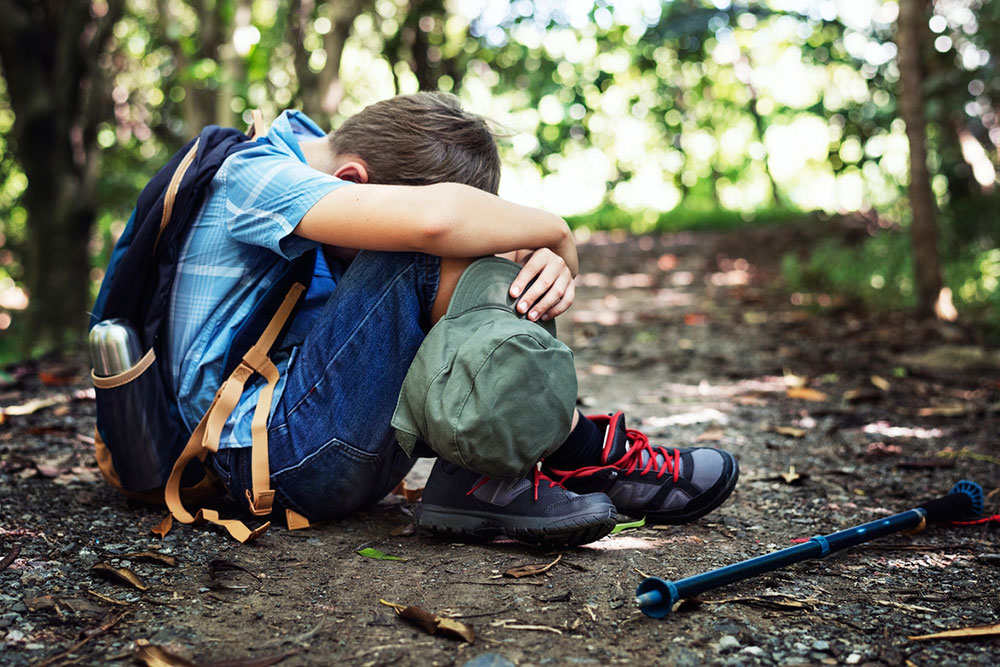Separation Anxiety In Children
Published on June 19th, 2019
Updated on January 2nd, 2024

Separation anxiety is experienced when a child feels distressed when away from parents, loved ones, or their home. The distress that they feel is outside of the norm for their age and development. The anxiety that affected children feel can cause them to have outbursts. They may struggle to cope with developing independence.
A child with separation anxiety will feel anxious when away from an attachment figure. An attachment figure is someone or something the child has developed an emotional attachment to. Typically, this can be a parent or caretaker, or their home. The child will worry about not being able to reunite with attachment figures.
Some separation anxiety is normal for toddlers. A mild to moderate amount of separation anxiety is natural for young children. Around preschool, a child should have some tolerance for being separated from their attachment figures. While they may feel shy or nervous sometimes, children older than three years old should not feel distressed. Significant anxiety that continues for one month or longer may be considered a separation anxiety disorder.
Sponsored by

Choose a therapist to work with and start healing with 20% off from BetterHelp.
Click HereSeparation anxiety makes normal life experiences distressing for a child. Such experiences include:
- Preschool or kindergarten
- Overnights at grandma’s house
- Sleepovers
- Daycare
- Playdates
Signs of Separation Anxiety
Separation anxiety disorder can carry through adolescence and into adulthood. It can also surface later on during childhood and can come and go in waves. Separation anxiety disorder can develop in late childhood and adolescence, but the older a child grows, the less likely they are to develop the condition.
A child who is suffering from separation anxiety may experience:
- Panic attacks or distress when expecting to be separated from their attachment figure
- Refusal to attend playdates or sleepovers without their parent present
- Intense fear of being away from an attachment figure
- Intense fears of losing their attachment figure to death or accidents
- Intense fear of being kidnapped or taken away
- Fear of being left at home without their attachment figure
- Nightmares, night terrors, or upsetting fantasies about being separated from or losing their attachment figure
- Physical stress when separated from their attachment figure (headaches, dizziness, stomachaches, etc.)
- A decline in academic performance
Causes of Separation Anxiety Disorder
There are several factors that may cause a child to suffer from separation anxiety. Finding the central cause for the anxiety can aid in recovery.
Sometimes separation anxiety stems from a single cause or event. Sometimes it occurs as a result of circumstances.
Factors that may cause a child to suffer from separation anxiety disorder include:
A Death in the Family. The passing of a loved one can be very stressful on a child. The concepts of grief and death can be confusing and overwhelming for a child. The confusion and sadness can cause them to anxiously attach to an attachment figure. This is especially common when the child loses a person or pet who was very important to them.
The concept of never again seeing someone who they used to see all the time is confusing and overwhelming for a child. This most often occurs when there is a primary member of the family involved. Primary family members can include pets, siblings and parents.
Genes and Family History. A child may inherit anxiety in their genes. They are at higher risk if a parent suffered from separation anxiety or another type of anxiety disorder as well.
Major Changes and Life Events. Big changes during childhood can cause children to suffer from separation anxiety. Changes can include:
- Parents divorcing
- Moving
- Sudden or traumatic separation from their attachment figure
- Spending time away from home due to stressful circumstances
- Stress resulting from natural disasters
- History of trauma or abuse
Can Separation Anxiety Be Treated?
It is important to seek treatment if you believe your child is suffering from separation anxiety disorder. If left untreated, the condition can persist into adulthood. It can also be co-morbid other mental health disorders, like:
- Generalized anxiety disorder
- Specific phobia
- Post-Traumatic Stess Disorder
- Depression
- Agoraphobia
- Borderline personality disorder
- Dependent personality disorder
- Obsessive-compulsive disorder
- Panic disorder
- Social anxiety
Common forms of treatment for separation anxiety disorder include:
Talk therapy (Psychotherapy). Talk therapy can be effective in treating separation anxiety. It helps to pinpoint the source of the fear of separation. Then, the child learns healthy coping strategies for their anxiety.
Cognitive Behavioral Therapy (CBT). By using CBT, the child learns how to cope with stressors in a healthy way. They learn how to face their fears of separation by using their skills to cope with symptoms.
CBT can also help teach parents how to support their child’s condition. It teaches parents how to support their child without enabling their anxious behavior.
Family Therapy. Family therapy is important in treating a child with separation anxiety disorder. Family therapy educates parents and family members about the condition. It also teaches how to be supportive of the child without enabling their fears.
Parents and caretakers learn how to encourage a child’s independence. They learn how to stop enabling behaviors that can be detrimental to the child’s recovery.
Sponsored by

Find an affordable therapist online with 20% off from BetterHelp.
Click Here






Leave A Reply